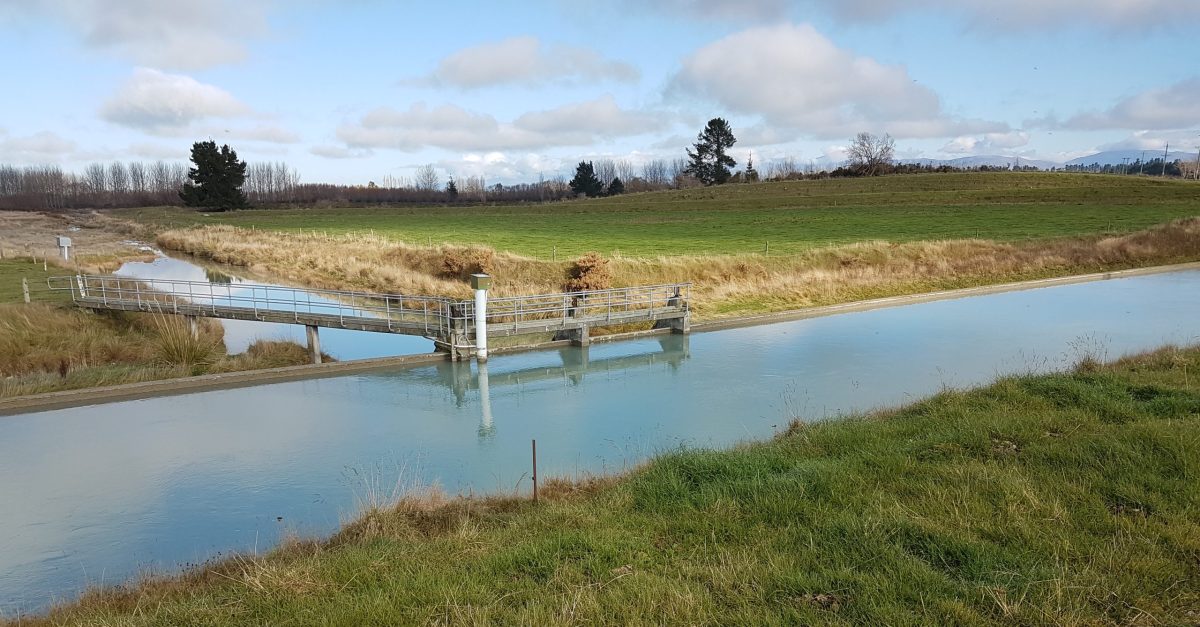Whether irrigation is associated with an increase or decrease in organic matter in New Zealand soils is the question addressed in the NZIAHS latest Hot Topic (you can read it HERE). We are publishing this at a time when irrigation has become the subject of a critical press and irrigators are being demonised, although much of the hostile publicity relates to claims about nutrients rather than carbon issues. How times have changed!
A hundred years ago, under the very positive headline “Irrigation boosts orchards”, the Otago Daily Times reported local hopes that the Government might undertake a scheme to irrigate the Cromwell flats with water drawn from the Roaring Meg. Orchard land at Ripponvale – where about 40,000 fruit trees had been planted – would benefit from such a development.
“An extension of the orchards is contemplated as soon as the irrigation of the whole property is practicable,” the ODT enthused.
The establishment of a dairying industry in the Hawea Flat district was on the cards at that time, too, if a supply of water for irrigation purposes could be secured. That district was then noted for its production of barley and wheat, but transport costs were an impediment to profitability and growers were being attracted by the possibilities of dairying. As the ODT put it, while unirrigated land in Hawea Flat was growing barley and wheat, “it will not grow grass, and it is essential therefore that the district should be assured of a supply of water before the settlers can embark on the fresh industry.”
Irrigation nowadays is not so assured of a good press.
The headline above an article posted on Newsroom in September last year was bland enough. It read “ACC lends $90m to huge irrigation scheme”. But the article questioned the wisdom of this loan and began: “Greenpeace says ACC’s irrigation loan is like the Climate Commission investing in an oil company.”
Nitrate pollution was highlighted in media reports on the Environment Court’s hearing of an application for a Water Conservation Order to protect the Te Waikoropupū Springs, the aquifer that feeds them, and associated water bodies. The New Zealand Federation of Freshwater Anglers struck a similar tone in a press release headed “Anglers’ Research Discloses Severe Nitrate Pollution In Public’s Rivers”.
Irrigation came into critical considerations, too, in a recent article for The Conversation which was republished by Stuff. This was prompted by a new paper which focused on nitrate pollution in Canterbury and examined the nitrate “grey water” footprint of milk production in the region.
But too often in cases aired by the media the arguments at best are tenuous and their relevance to irrigation and carbon perhaps is spurious.
New Zealand can afford to use water for irrigation, because we are typically advantaged by having lots of water available, unlike Australia. This may or may not mean we can sequester more carbon. A key requirement would be to use that water responsibly without increasing nutrient run-off.
At issue in our latest Hot Topic is whether irrigation is associated with an increase or decrease in organic matter in New Zealand soils. This question is addressed by Dr Jacqueline Rowarth, who reviews the literature and outlines the factors affecting changes in soil organic matter (approximately 58% of which is soil carbon) under irrigation. Her article also considers implications for the future in a water-sensitive and carbon-sensitive world.
The topic is contentious and complex, Dr Rowarth writes, and like many questions in science, the best answer is “it depends”. Knowing the factors upon which “it depends”’ will help decision-making.
And nitrate pollution? NZIAHS has a Hot Topic on the drawing board to investigate this. We will keep you posted.
Congratulations
 On behalf of NZIAHS I am delighted to congratulate Professor John Hampton, who has been honoured in the Queen’s Birthday and Platinum Jubilee Honours List 2022. John has been made an Officer of the New Zealand Order of Merit for services to agricultural science.
On behalf of NZIAHS I am delighted to congratulate Professor John Hampton, who has been honoured in the Queen’s Birthday and Platinum Jubilee Honours List 2022. John has been made an Officer of the New Zealand Order of Merit for services to agricultural science.
A long-standing member and Fellow of the Institute, John was one of four New Zealanders honoured for services to science. He joined NZIAHS in 1995, became a Fellow in 2006, and served on the NZIAHS Council for many years. He is currently serving on the Canterbury Section Committee which organises the annual Canterbury Forum.
The honours citation says Professor Hampton has had a 48-year career in agricultural research, business and education, most prominently with innovation related to the seed industry.
He was a key driver in establishing the Seed Research Centre at Lincoln University in 2009, where he is Professor of Seed Technology and Director and leads the sourcing of industry funding from companies annually. His professional speciality and research outcomes have centred around seed quality, production in both conventional and organic systems, and bio control of pests and diseases, and have had strong practical benefits for the industry.
He has been President of the International Herbage Seed Group, the New Zealand Agronomy Society, and the International Seed Testing Association, also holding leadership roles with the Seed Testing Associations’ Vigour and Association Rules Committees, making a key contribution to the introduction of vigour testing of seeds internationally.
He has held science leadership roles with such projects as ‘Smart Seeds for Export’, PGG Wrightson Seeds Primary Growth Partnership, Ravensdown Biologicals for Pastoral Agriculture, and ‘Suppressing urea-nitrogen wastage using a bioinoculant’, and a current international foreign aid project in Nepal.
Professor Hampton has been a visiting professor with the Department of Agronomy and Plant Breeding at the University of Tehran in Iran and with Qingdao Agriculture University in China.
Professor Julian Heyes
NZIAHS President













